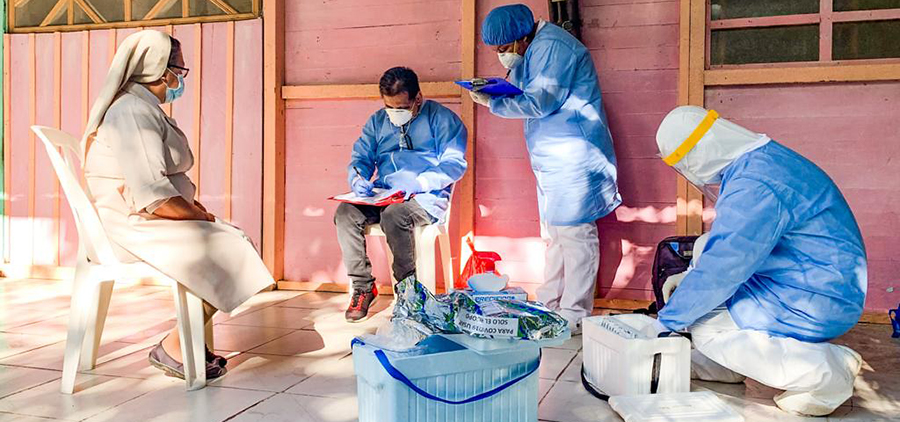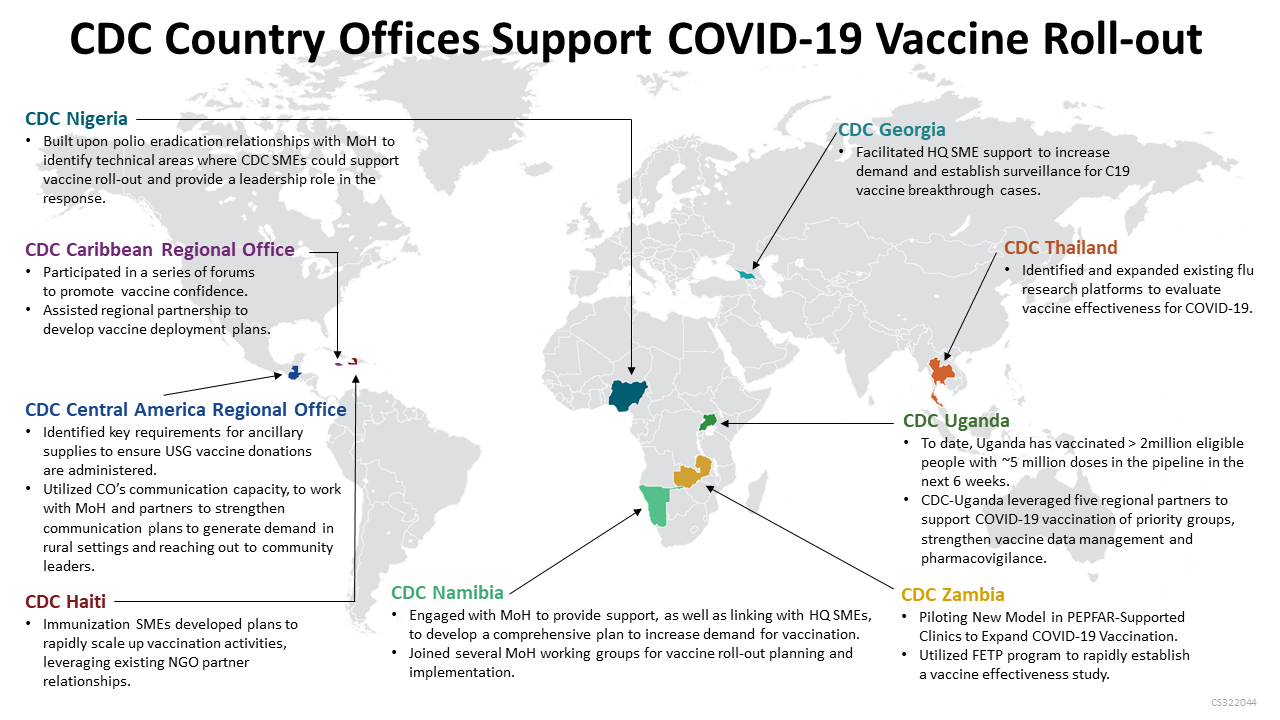CDC Provides Technical Assistance to COVID-19 Vaccine Rollout

Colombia FETP COVID-19 field investigation with the Amazonas State Department of Health in San Juan de Atacuari on the Brazilian border, May 2020. Credit: CDC Global.
CDC’s global COVID-19 activities enhance response capabilities and simultaneously build longer-term, sustainable capacity for response to future highly communicable diseases, including the vaccine rollout for COVID-19.
CDC’s country offices have been critical to supporting the COVID-19 vaccine rollout, leveraging existing relationships, preparedness, response, and capacity investments, and ensuring quick access to response funds in country.
CDC collaborates with ministries of health, partner organizations, and multinational entities, including WHO and COVID-19 Vaccines Global Access (COVAX), the global collaboration to accelerate progress towards the development, production, and equitable access to COVID-19 tests, treatments, and vaccines. These collaborations work to plan, implement, and evaluate national COVID-19 vaccination programs.
CDC works with partners to:
- Ensure low and middle-income countries (LMIC) are ready to deploy and evaluate COVID-19 vaccines.
- Reduce disease burden and transmission in LMIC, which in turn reduces the threat of COVID-19 globally and the threat of new variants.
- Participate in safety monitoring guidance development, and works to ensure appropriate vaccine safety monitoring is established and maintained.
- Develop strategies for responding to public concerns about vaccines and guidance on countering common myths and rumors.
- Ensure the rapid distribution and administration of COVID-19 vaccines is taking place with appropriate health equity considerations wherever feasible.
- Provide technical expertise to gather and synthesize evidence to support new policy and global guidance.
CDC works to help ensure that LMIC can implement and evaluate the available COVID-19 vaccine campaigns. The broader aim of this effort is to establish and strengthen sustainable immunizations programs.
Taking on COVID-19 in Zambia
CDC established an office in Zambia in 2000. CDC works with the Ministry of Health and provincial health offices to address HIV, tuberculosis, malaria, and other infectious diseases. CDC supports international and local organizations that help build the capacity of the ministry of health and to provide health services at the national and community level. CDC also supports national program efforts in workforce development and health systems strengthening.
CDC’s Global Rapid Response Team (GRRT) is a unique resource that can rapidly respond to global public health concerns, both within the U.S. and abroad. Since its inception in 2015 and through 2020, GRRT staff have spent more than 61,800 person-days deployed in over 1,450 total mobilizations. GRRT has responded to multiple emergencies including cholera outbreaks, COVID-19, dengue, Ebola, hepatitis A, measles, polio, yellow fever, Zika, famine, mass gatherings, and natural disasters.
In April 2021, Kerton Victory, PhD, joined the CDC team in the southern African nation of Zambia for a 90-day assignment through CGH’s GRRT program. Kerton is a senior CDC epidemiologist working in the Center for Global Health’s Division of Global Health Protection; he is a disease detective and a member of CDC’s Global Rapid Response Team.
CDC Zambia works with the Ministry of Health (MOH) to support the country’s efforts to contain the spread of COVID-19.

U.S. CDC’s Kerton Victory, PhD., conducted a COVID-19 vaccine readiness site assessment at a Hospital in Lusaka, Zambia with colleagues from the Ministry of Health (MOH). Credit: Champo Chola/Zambia MOH.
“We are currently working with the MOH and local health officials to develop a national tracking system so that we can see if people have any adverse reactions to the COVID-19 vaccine and how we can go about documenting that,”
“CDC Zambia and I worked with the Ministry of Health to create messages and communication strategies to explain the benefits of vaccines,” Dr. Victory said.
CDC Zambia and local health officials also set up focus groups in different communities to learn more about how to increase COVID-19 vaccine demand. Social media was used as a strategy to convey and reinforce prevention messages. Showing people getting vaccinated could help encourage others to get the vaccine, too.
“We worked with religious leaders and people who are famous, like movie stars and local celebrities, to get the message out about the importance of getting the vaccine,” Dr. Victory said.

This poster explains that to “Kick COVID-19 out of Zambia” vaccinations and continued observance of the MOH’s Five Golden Rules are necessary. Credit: Kerton Victory/CDC.
